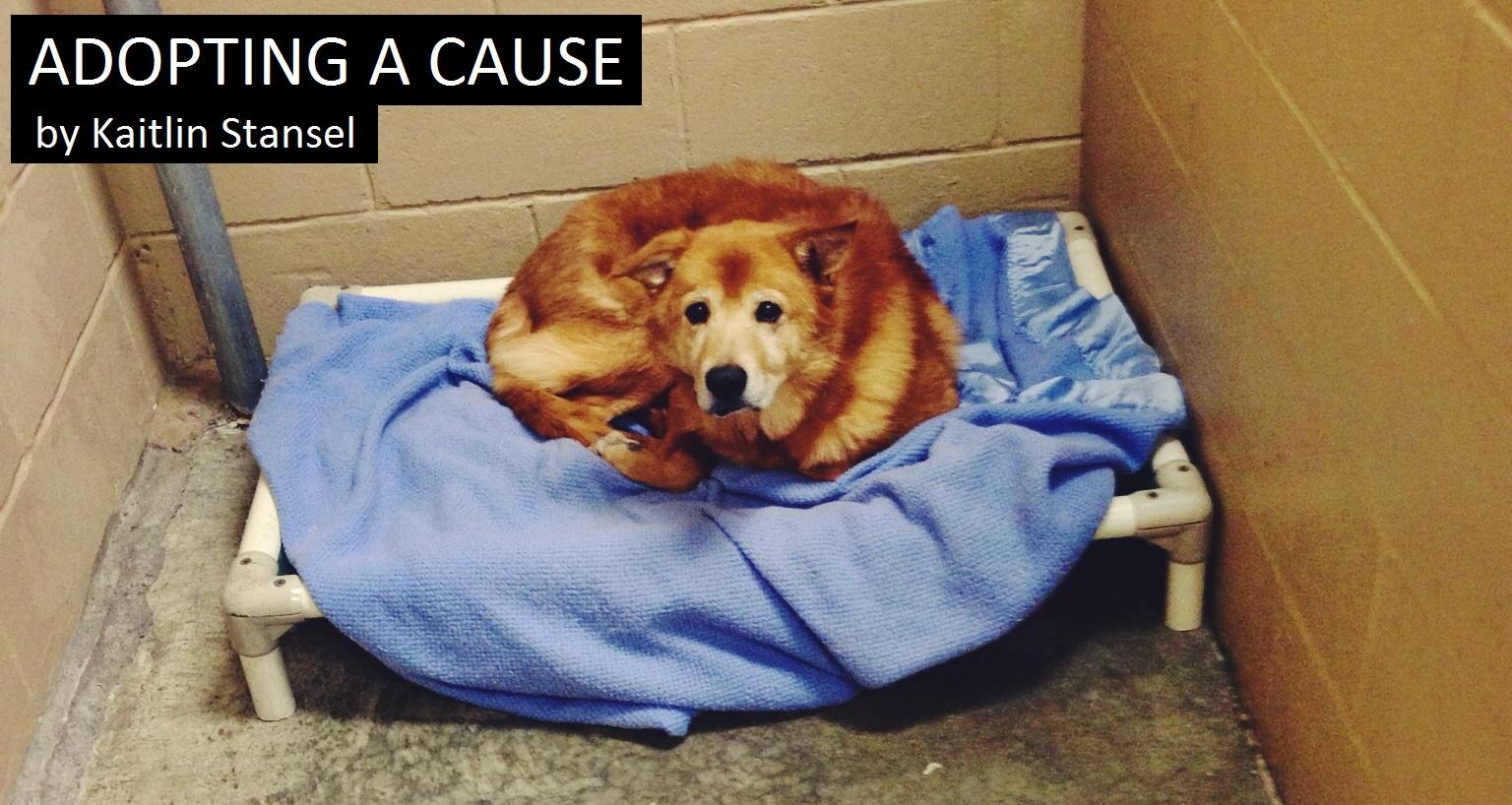Adopting a cause
Not every dog needs saving, but some rely on the kindness of strangers.
May 7, 2014
RAMAPO, N.J. – Noises. The arrhythmic chorus of barking overwhelms my ears. I am bewildered.
Faces. What seems like an intricate mosaic of faces circles me, and I quickly become surrounded by both humans and animals. Their nomadic eyes trace my every move.
Warmth. An unexplainable sensation of comfort envelops me like a blanket still temperate from use. This unparalleled pleasure is foreign.
With caution I touch my worn paw, lightly stained with dirt, against the cool, speckled tile. A short distance away a warm face wreathed with a welcoming smile and slightly blushed cheeks encourages me towards her.
She coos in an alien language, and her words charm my ears. I hesitantly begin to trust her. As the wet of my discolored nose nudges her porcelain hand, she whispers, “You’re safe now, you have a home here.”
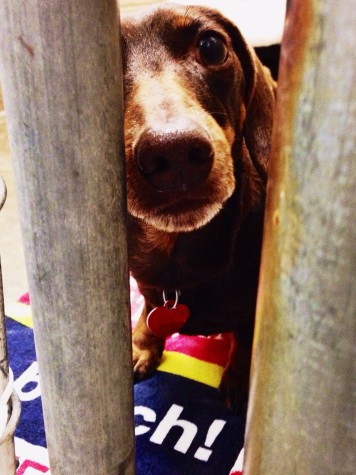
Ramapo-Bergen Animal Refuge is Bergen County’s leading non-profit no-kill animal shelter. Every year, the shelter places close to eight hundred animals in nurturing, amicable, and welcoming homes.
But Ramapo-Bergen Animal Refuge, or RBARI for short, is not funded by the state; the shelter is instead run on the volunteer hours of one-hundred active members from a two-thousand member database, with an additional twenty paid part-time staff members.
“We rely on our board members to help us because we have a small administrative staff and that allows us to focus most of our resources on our animals,” said Tricia McAleer, RBARI’s executive director.
McAleer has been executive director since last March; however she has always immersed herself in a life full of animal rescue.
A broken wing
The sun warmed the green of the High Mountain Golf Course on April 1st, 2013. The air was calm for the golfers attending the Ramapo-Bergen Animal Refuge fundraiser in memory of their own Dr. Cheryl Welch who passed away in 2010.
Tricia McAleer observed the course as the golfers positioned themselves.
McAleer, in her first days as executive director of Ramapo Animal Shelter, watched as a huddle of people in khakis and colorful polos gathered in a circle around an unidentifiable mass.
McAleer parted the group as its nominal leader, and she hesitantly neared the thrashing, injured figure. It was a goose, crippled by an injury to its wing but serendipitously put in the path of an animal advocacy group.
Without hesitation, she removed her silk scarf and wrapped it tightly around the wounded goose. Nestling the bird into her chest, she carefully got into a nearby golf cart.
McAleer’s next actions were instinct: with a sense of urgency, she brought the injured bird to the nearest animal hospital.
RBARI was a welcoming, familiar home to animals, and it was also her home.
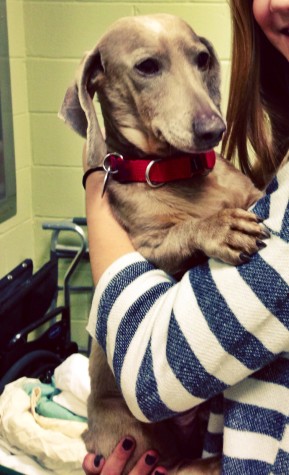
On April 1st, 2013, when the sun warmed the green of the High Mountain Golf Course and the calm winds enveloped the golfers, Tricia McAleer was also adopted into a family unparalleled by any other, the Ramapo-Bergen Animal Refuge family.
Today, a year later, she has since helped many animals find their forever homes.
“Never doubt that a small group of thoughtful, committed citizens can change the world; indeed, it’s the only things that ever has.” –Margaret Mead
“Running the shelter is not a one person job,” McAleer said, describing the process that goes into maintaining and running a shelter.
RBARI is a non-state funded animal refuge; therefore, it functions mainly on the generosity of its community.
“We wish for people to know we exist,” said Regina Rodriguez, RBARI’s vice president and chair of public relations.
Every week, the shelter employees and volunteers work feverishly to make the community aware of the shelter’s vast range of needs. Each month, Rodriguez sends an E-letter to approximately seven thousand volunteers, employees, adopters, businesses, vets, and patrons describing the recent successes of the shelter and upcoming programs. Additionally, a print newsletter is mailed and posted in the fall and spring seasons.
Prospective volunteers, contributors, and animal lovers can visit the Ramapo-Bergen Animal Refuge website to view shelter programs, donation lists, volunteering information and opportunities, available cats and dogs, fundraising events, and information about the shelter itself. The website is frequently updated to provide current information and additionally provides a weekly featured cat, dog, and volunteer.
In an appeal to potential volunteers, McAleer said, “In order to understand the world of animals, you need to observe it firsthand.”

Perhaps this mindset is the motivating force behind the many of the community events RBARI organizes.
With the help of local organizations and corporations, the shelter hosts a plethora of fundraising events for people of all ages and varying interests. On October 22nd, 2014 the shelter will be holding its annual Tricky Tray at Macaluso’s. The event hosts close to four hundred guests and auctions off approximately five hundred gifts that are donated by its benefactors and local businesses. In previous years, the event has raised over $25,000 dollars that has gone directly back into the shelter to provide for exceptional care of animals, in hopes that they will soon find their ‘forever home.’
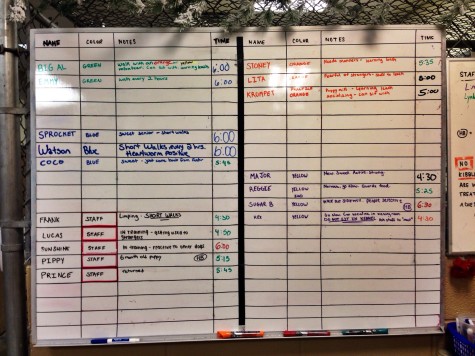
RBARI leans heavily on its community to assist in spreading rescue-awareness in hopes of an increase in adoption rates and animal cruelty mindfulness.
“We wish to see a better community awareness of what our shelter does, it’s not a sad environment,” said Linda Roseman, dog trainer, groomer, and volunteer coordinator.
“The highest of distinctions is service to others.” – King George IV
Every day children, parents, and grandparents of varying generations walk through the welcoming lobby.
One day, a lanky man wearing a tattered black hat and cloaked in a large brown coat saunters through the heavy steel and glass doors, arms filled with dog food and toys.
Later that day, a young girl in her early twenties studying to be a vet rubs the belly of a content Frank, a six year old pit bull rescued from the inner city.
Another day, a woman with colorful sneakers and running tights gaits into the office in search of a new puppy for her young family of four.
Later that week, an elderly woman is guided through the maze of corridors of the shelter by what appears to be her grandchild. The woman is in search of an affectionate furry friend to keep her company when her granddaughter can’t.
“We have twenty new volunteers a month from all walks of life,” Roseman said.
Everyday, Linda Roseman dedicates her valuable time and energy towards improving dog and human relationships. Roseman’s impressive variety of skills brands her as a jack-of-all trades. Roseman does anything and everything from training both dogs and new volunteers to fostering puppies. In addition, she grooms the animals of RBARI in hopes of improving physical appearance so that they appear more adoptable.
“My life has gone to the dogs,” Roseman joked.
RBARI is always searching for new volunteers. Volunteers not only work hands on with the animals, but also do office work, maintenance, help run fundraisers, work at off-site locations, and perform a variety of other unique jobs.
“It’s amazing how many different jobs you can do as a volunteer,” said Roseman.
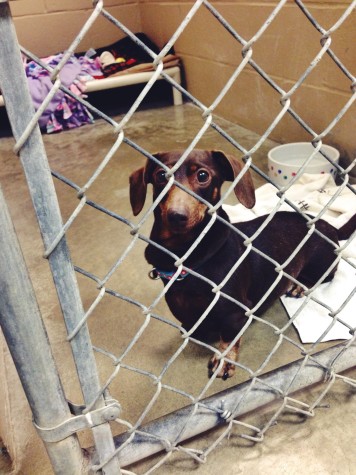
The process is simple to become a volunteer. Those eighteen years of age or older can fill out an online application to work with both dogs and cats, once approved, people attend a general meeting to become familiar with the shelter itself and its beliefs and policies.
From there, applicants appear at an orientation specific to the type of animal s/he are working with, either cat or dog (or both), to learn about the proper procedures taken to properly care for the animal.
Those younger than eighteen can still volunteer at the shelter, but the initial application is slightly different. Applicants must write an essay portraying why they are interested in volunteering at RBARI and what they can offer to the shelter; once approved applicants go through an interview process. After this process the volunteer will attend the two orientation classes.
Although RBARI’s system of welcoming new volunteers appears tedious and overly precautious, the procedure is strategically designed. “We think it’s important to give enough training to volunteers so that they are empowered and our dogs and cats get consistent treatment,” McAleer said.
Faculty like Roseman spend one-on-one time with volunteers and animals to ensure that both dog and human get the most out of their RBARI experience. “I wish to get the true potential form every volunteer and animal in order to do them justice,” Roseman said.
“Patience is not the ability to wait, but how you’re acting while you’re waiting.” – Joyce Meyer
Krumpet, a white six year Bichon Frise, quivered anxiously in the corner of a small tiled square room, furnished with a quaint sofa and a worn fabric chair.
Connected to the dog by a loose leash on the other side of the room is Kathy Donnelly, a volunteer at RBARI since last spring.
The dog Krumpet is the product of years of puppy mill breeding. A puppy mill is a large-scale commercial dog breeding operation that places profit over the well-being of its dogs, which are often severely neglected. The puppy-mill operations act without regard to responsible breeding practices.
“It’s good to have a relationship with puppy mills, because it’s not going to stop,” Donnelly said.
Puppy mill dogs tend to have an extreme wariness toward people. These behaviors are the psychic fallout of being reared in desolate surroundings without basic experiences, like the feeling of smooth blades of grass beneath their paws or the joys of a comforting tender belly rub.
Volunteers like Donnelly sit patiently with puppy mill dogs in an attempt to slowly socialize them, a process that can take anywhere from weeks to months.
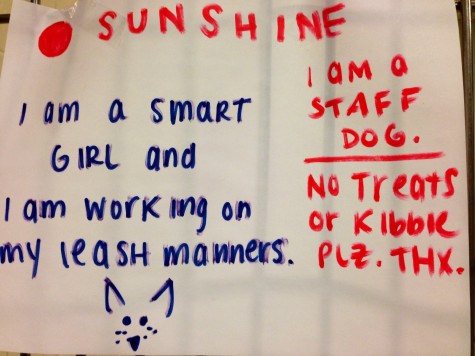
“This is a wonderful place. They really care about the animals and treat each one as an individual. They don’t just give up,” said Donnelly as she softly rolled a tattered tennis ball towards Krumpet.
Donnelly coos tenderly to Krumpet, saying, “you’re no longer running around in fear” and “you’re a good girl who deserves a good life”. Her soft words are delivered with a feeling of invitation and warmth.
“I just sit and talk until she’s ready to come over, it may not be tonight, but she will,” Donnelly whispered between encouraging coos.
Over time Krumpet inches closer, welcomed by Donnelly’s softhearted words. Paw by paw the distance between Krumpet and Donnelly decreases. Donnelly gently glides her delicate hand over the tile squares towards the curly white haired pup and with a final whisper she says, “This is your home, but Krumpet, you will find a forever home”.
The warmth of Donnelly’s pale skin and Krumpet’s soft white fur touch.
“The dog was created specially for children. He is the god of frolic.”- Henry Ward Beecher, Proverbs from Plymouth Pulpit.
RBARI executes their strong belief that it’s their mission to give back to the community in all aspects of life through PAWS IN HAND, a program that educates kids with disabilities (such as ADHD, autism, etc.) to have a better relationship with dogs.
“PAWS IN HAND is a humane education outreach program founded by professional dog trainer Jean Decesaris who laid all the groundwork for RBARI and our amazing group of volunteers to continue on her mission to socialize handpicked RBARI shelter dogs and take them to a special needs school where the students (grades 6, 7, 8) have a four week session with them,” said Laura French Spada, PAWS IN HANDS coordinator and volunteer.
Spada attends Windsor School, an institute in Pompton Lakes that leads in the field of specialized education, weekly with RBARI dogs to reinforce basic dog training ideas.
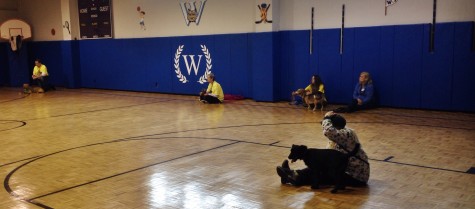
“We have about 5 4-week sessions where we meet with the kids once a week. With as many as 5-6 dogs with handlers and 1-2 more volunteers to lead and supervise,” Spada said. “We really drive home ‘how to greet a dog’ as well as how the dogs come to be at the shelter and how they all can help the dogs trust people by the way they move and encourage the dogs.”
The results of the program are obvious. The children’s faces are dressed in ear-wide smiles as they appropriately address the dogs, and their euphoric laughs can be heard down the bright, linoleum hallway.
“It’s a 100% win-win-win endeavor,” Spada said. “The dogs, kids and volunteers all feel great after every 45 minute class. We are so glad to see puppy mill rescues ‘melt’ when they see they can trust us, and how the kids beam when they can get a dog to sit and lie down.”
The PAWS IN HANDS education project provides benefits for both the shelter and the children. Not only does RBARI help spread word of the shelter, the program has many therapeutic benefits for the children with disabilities of different capacities and natures.
Dogs provide emotional support for humans and, in just being around children with disabilities, they fill a void as a reassuring companion and can help ease the sensory overload that many children experience with disabilities such as ADHD, autism, and Down syndrome. Dogs assist in helping children who need extra assistance in filtering out sensory input, since all their senses (sight, sound, touch, smell, and taste) occur simultaneously and can be overwhelming. Dogs redirect their stimuli and provide a focal point to ease their environmental experiences. Dogs can comfortably serve as a link for a child with disabilities to the intricate world around them and provide unconditional love and patience that cannot be mimicked by even a special education professor.
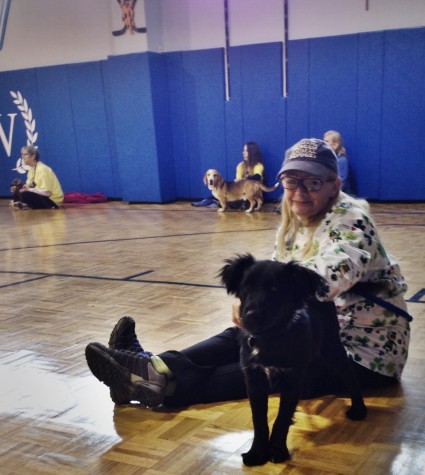
“The point of it all is that the dogs get out of the shelter and have the opportunity to be handled and even briefly trained, the kids get rewarded for good behavior at school by being allowed to attend our class, and the volunteers have the opportunity to handle the dogs, learn effective training techniques and to work with the great staff and students at the schools they work with,” Spada said.
Watching a child discover the wonders of animals and create relationships with them is an unparalleled experience. An encounter like this is an experience that can only be provided by the benevolent and patient animals and volunteers that the PAWS IN HAND program employs.
“Dogs are not our whole life, but they make our lives whole.” – Roger Caras
Although RBARI serves many purposes other than acting as an animal refuge for homeless cats and dogs, the shelter’s main role is to provide its animals with nurturing homes.
“Our commitment to our animals is life-long,” McAleer said. Although the refuge receives animals from a variety of different situations (such as hoarding scenarios and puppy mills), RBARI’s main source of feral animals is due to a process called surrendering. When a person surrenders an animal, they deliver that animal to a shelter. These owners are typically unaware of the commitment that accompanies a dog or cat, but a person may also surrender an animal for reasons out of their control, for example a new child that is allergic.
“It’s not like buying a purse, when you adopt a cat or dog you have to be ready for a commitment,” Rodriguez said.
Lisa Esak, adoptions manager, reminds future parents to “be patient and open minded.” It is common for families to come in looking for a specific breed, size, color, or look. However, one’s vision of the pet they are seeking may not be suitable with the family’s dynamic and chemistry.
“You’re taking on the life of something,” Esak added. “So you have to be objective and logical.”
RBARI uses a “match-making” process to pair prospective owners and pets together. The service takes into account the family’s environment, lifestyle, personality, dynamics, and interests to match a dog or cat with a personality that will perfectly match that household.
When looking for a new addition to the family, Esak advises adoptees to “pay attention to the first instinct of what you want in a pet” so that a perfect match can be suitably established.
McAleer’s message to future adoptees is simple: “Thank you for choosing to adopt, it’s a commitment and you have to be ready for it, and we are there for you when you are.”
For some lucky animals, however, their journey in search of a forever home is nearly over.
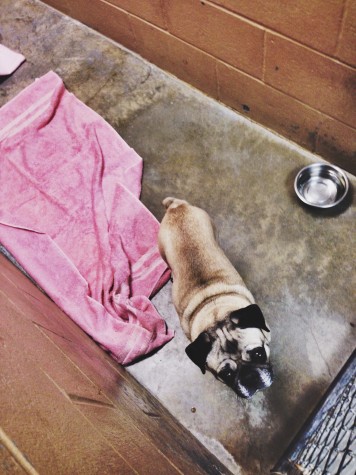
One of Glen Rock High School’s own, Ms. Wombough, student assistance counselor, has just recently welcomed another furry friend into her budding family. Wombough is the gratified parent of Jada, a one-year-old Shih Tzu and Dachshund mix.
“I’m extremely excited to have a new member in my family. They [RBARI] were very thorough in making sure she went to the right home,” Wombough said.
Glen Rock residents, The Stansels, recently welcomed two white-long haired cats into their household in November of 2013.
“They make everyone around the house happy from their presence, love, and affection,” said Carter Stansel, 13 years old and student at Glen Rock Middle School.
The Stansels are returning RBARI rescuers; they previously adopted two cats from the shelter in 1996.
“This is the second time that we’ve adopted cats from RBARI and the reason that drew us to them is because they were a no-kill shelter and they do great things,” said Kara Stansel, mother of three.
Even though it was the second time around, RBARI was still thorough in matching the Stansels with their ideal kittens. They introduced the entire family to the kittens and encouraged the family to interact with the infant animals. They guided them through the adoption process and catered to their every question.
“They were helpful and caring during the adoption process and did what was best for the animals,” Kara Stansel said.
Five months later and the family remains charmed by their two furry friends. “The animals we adopted from RBARI immediately became an integral part of our family. I can’t imagine life without them,” said Tim Stansel, father of the household.
“Saving one dog will not change the world, but surely for that one dog, the world will change forever.” – Karen Davison
Awakened by a loud creek and slam of a heavy door, I quickly jolt my head up. Eager and restless at the sight of two rosy welcoming faces, an animated child walks near accompanied by her smiling mother.
“Rex! It’s your lucky day buddy, you have someone here to see you!”
With excitement, my calico tail sways swiftly from side to side.
Thoughts swim rapidly around my head. In the week that I have been here, I watched as elated families welcome their new members, and I learned to trust the affectionate nature of the many people here.
I was beginning to feel comfort in this alien new home, but perhaps I am still a bit intrigued by the life offered outside of the modest building.
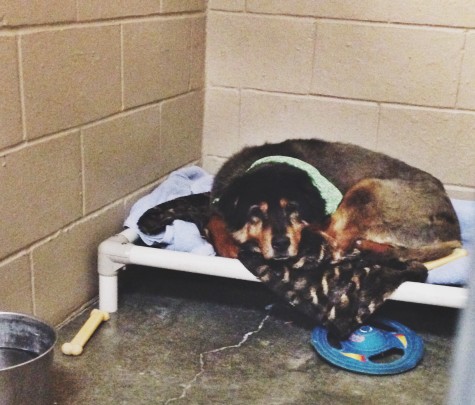
The child crouches down to greet me at eye level. A sense of familiarity overcomes me as my wet nose meets her face, a large broad toothless smile.
It’s unexplainable why things happen and if there is a reason for them occurring. Like how I ended up in this welcoming shelter, or how this spirited young girl ended up crouches down next to me, scratching my belly as I lick her soft skin.
Until this week the idea of having a place to lay my head at night or a bowl of food guaranteed twice a day was foreign. I now walk around with a sense of comfort and relaxation, assured my daily encounters with others wouldn’t be a fight for the little life I had left.
“Mommy, mommy! Please can we get him?”
The woman leans over, lending me her supple hand, I tentatively licked it with my tongue.
I watched in anticipation as the woman turned to the little girl with a look of contemplation then back at me.
Touching her hand to my newly washed Chester coat she beamed blithely and said, “You’re safe now Rex, your forever home is with us.”
